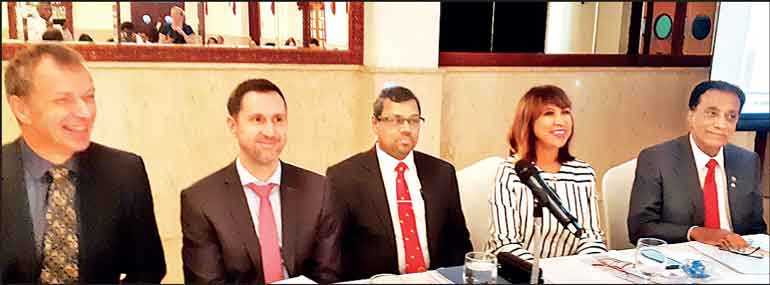Thursday Feb 19, 2026
Thursday Feb 19, 2026
Saturday, 25 January 2020 00:04 - - {{hitsCtrl.values.hits}}

From left: UNIDO India Representative Regional Office Rene Van Berkel, UNIDO Vienna International Centre Regional Division of Asia Pacific Chief Ralf Bredel, Secretary to Ministry of Industry and Supply Chain Management J.R. Ranjith, UN Resident Coordinator Sri Lanka Hanaa Singer and UNIDO Focal Point Sri Lanka National Director Nawaz Rajabdeen seen at the launch event of new UNIDO Sri Lanka Country Program 2020-2024 at The Kingsbury yesterday
A high-level team from United Nations Industrial Development Organisation (UNIDO), Vienna joined by the UN Resident Coordinator Sri Lanka launched the next phase of Sri Lanka industry revolution yesterday in Colombo.
UNIDO said that it was impressed by the feedback received by Sri Lankan industries for its latest initiative in Colombo.
“Sri Lanka’s industry sector contributes 27% to its GDP. The Government’s objective is to move the economy from an economy intensively based on resources to an economy based on knowledge-based industries – moving Sri Lanka from ‘Industry 2.0’ and ‘3.0’ to ‘Industry 4.0,’” said Vienna-based Chief of Regional Division of Asia Pacific UNIDO International Centre Ralf Bredel yesterday in Colombo.
Bredel was addressing the launch event of the new UNIDO Sri Lanka Country Program 2020-2024 (UNIDOSLCP) themed ‘Towards Inclusive and Sustainable Industrialisation in Sri Lanka’ at The Kingsbury.
Joining Bredel at the event were United Nations Resident Coordinator Sri Lanka Hanaa Singer, Sri Lanka UNIDO Focal Point National Director Nawaz Rajabdeen, UNIDO India Regional Office Representative Rene Van Berkel, UNIDO Vienna International Centre Senior Research and Industrial Policy Officer Dr. Anders Isaksson, Secretary to Ministry of Industry and Supply Chain Management J.R. Ranjith, and 30 representatives from the business sector, UN and EU agencies, Government institutions, chambers and industry representatives.
“The objective of UNIDO’s new country program discussed today is to see how we can support these endeavours. The ambition is to go beyond just the number of isolated standalone projects to follow a programmatic approach which is also able to make an impact in industrial policy level. The ambition is to manage expectations very carefully, and the Sri Lankan Government wants to make sure that there’s clear ownership on all sides. We’ve had a number of bilateral discussions with many Government departments and also with development partners in the last two days and we are very impressed by the feedback that we received, which will be informing our country program. The purpose of our meeting today is twofold – presenting our diagnostic on the current industry development situation in the country to you and to see what is UNIDO’s programmatic priority approach to that,” UNIDO’s Bredel.
Bredel added: “Of course, we are plainly aware that Sri Lanka is in an interim period with general elections slated for April. Still the Government wants to focus on technology – change, innovation, and digitising the economy. Drawing from our broad experiences in other parts of the world UNIDO is very happy to support and to transfer some experiences to Sri Lanka’s national policy framework. Three programmatic priorities of UNIDO’s Sri Lanka country program are discussed today – Industrial policies, support for development of value chains especially in processing, and engagement of environment. The signs are that the substance of our cooperation with the country program is right. I should emphasise that UNIDO is not a funding agency but a technical agency. We have to be realistic in terms of what we can produce at this point; we are very willing to explore how we can facilitate interaction. The 2019 Abu Dhabi Declaration moved to develop global manufacturing alliance through business sector engagement. The business sector is very important; through Sri Lanka’s Industrial Development Board we were trying to reach out to the business sector.”
“The United Nations Secretary-General launched the Decade of Action, which is a call for everyone to take ambitious actions to deliver the 2030 sustainable development agenda. We only have 10 years left to achieve these goals,” said UN Resident Coordinator Sri Lanka Hanaa Singer.
“There is a very urgent need to step up action. Therefore, this meeting here today will look at transforming and directing industrial development in Sri Lanka towards inclusive and sustainable outcome. There is a need to focus on drivers for sustainable development, including industry, infrastructure and innovations as captured in MDG 9.”
“Shaping Sri Lanka’s new industrial policy based on the requests and requirements of local industries, adopting green concepts and industrial safety are the pillars of new UNIDOSLCP ’20-’24,” said UNIDO India Regional Office Representative Rene Van Berkel. “This is a major support intervention for Sri Lankan industry sector since the last Country Program successfully closed in 2015. The new program is the first such program for Sri Lanka that involves inclusive and sustainable industrial development.”
After comprehensive kick-off of presentations made by UNIDO’s Dr. Anders Isaksson (Senior Research and Industrial Policy Officer, UNIDO Vienna International Centre) to the audience, including many stakeholders, joining the 24 January event gave in-depth feedback on UNIDOSLCP’s way forward.
UNIDO now expects to finalise all local industry consultations by May 2020 and to introduce the finalised Country Program (CP) immediately thereafter. The UNIDOSLCP formulation work is a highly-collaborative process and will involve Sri Lankan industries in many stages of the process.
UN’s Goal 9 SDG (infrastructure, industrialisation and innovation) is a driver of productivity, inclusive economic growth and job creation and is the sole SDG that directly involves industries of the world.